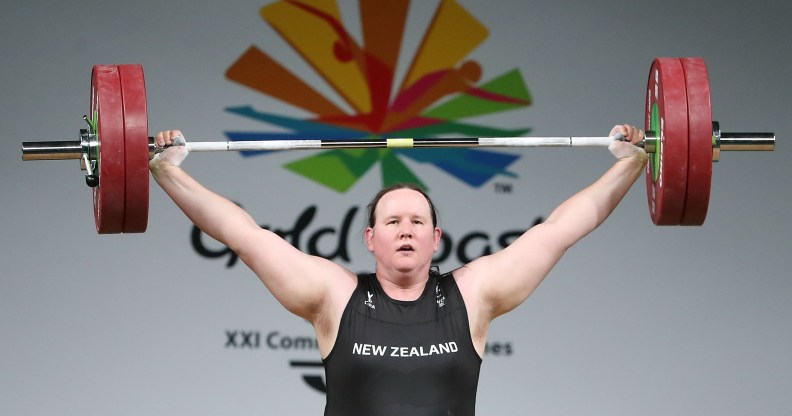Deadnaming trans people like Olympian Laurel Hubbard is shameful, disrespectful and needs to stop

Laurel Hubbard of New Zealand competes in the Women’s +90kg Final during the Weightlifting on day five of the Gold Coast 2018 Commonwealth Games. (Getty/ Scott Barbour)
Olympic hopeful Laurel Hubbard was inexplicably deadnamed by the Daily Mail this weekend. This is why the unnecessary, harmful practice needs to get in the bin.
The New Zealand weightlifter will be the first openly transgender athlete to compete in the Olympic Games.
Like most of us, Laurel’s life story is complex. Her road to Tokyo this summer has not been simple or direct.
After weightlifting at school and setting a national junior record aged 20, she stopped lifting in 2001, aged 23, “because it just became too much to bear … just the pressure of trying to fit into a world that perhaps wasn’t really set up for people like myself”.
After coming out as trans in 2012, Laurel began lifting again – now competing as a woman. She’d spent more than a decade out of the game, and it was five years before her first international outing in 2017.
She won that competition – the Australian International & Australian Open in Melbourne – becoming the first trans woman from New Zealand to win an international weightlifting title. And that’s where the hatred really began, with the Australian Weightlifting Federation’s chief executive, Michael Keelan, calling her win “unfair”.
In the four years since, she’s been subject to ridicule and hatred from the press, anti-trans campaigners, and sometimes her opponents and peers. She’s also been warmly supported by New Zealand’s prime minister, Jacinda Ardern, her opponents and her peers.
Laurel Hubbard’s name has become synonymous with the misogynist “debate” over whether it’s “fair” for trans women to compete, with her own medical transition, a deeply personal journey, picked over by cisgender commentators and weaponised in conversations about “permissible” levels of testosterone for female athletes (World Athletics, which decides what level of testosterone makes a woman, has now excluded several cis, Black female athletes from competing because their own testosterone levels exceed that which is deemed female).
There is no reason whatsoever to reveal the deadname of a sportswoman.
And in the hundreds of articles about these rules, and this debate, Laurel’s name and photo are used to illustrate the point. The media love a first, so she was already going to be highly publicised. But the hostility of the coverage and the attacks on her humanity are breathtaking. The latest iteration of this came from the Daily Mail, which sent a journalist to find her old schoolmates and dig up some dirt.
In the headline, the Daily Mail deadnames Laurel – putting her pre-transition name in quote marks and big font. Unsurprisingly, the paper also misgenders her in the piece (the Daily Mail was contacted for comment).
There is no reason whatsoever to reveal the deadname of a sportswoman – apart from to insult, belittle or mock her. Newspapers commonly out LGBT+ people, still, and trans people are no exception. It is still a disappointingly common practice for newspapers to use the deadname of celebrities when they come out as trans or non-binary.
But the practice of deadnaming trans people in papers must stop. Here are five reasons why it’s an outdated, dehumanising practice that needs to get in the bin.
1. Being deadnamed implies that a trans person’s name isn’t their ‘real’ one
Trans people’s names are their names. Sometimes they are not our legal names, because sometimes changing your name legally is made harder by transphobic laws. But they are still our names, just as we are still who we say we are. Not using our names, misgendering us, using the wrong pronouns, all erase and question our sense of ourselves.
Many people use names they have chosen for themselves, and the media does not mention their birth name when writing about them – Lady Gaga, Madonna, Demi Moore, Whoopi Goldberg. Trans people should be accorded the same respect.
2. It is disrespectful
As Laverne Cox says, using a trans person’s deadname is “the ultimate insult“.
3. It is unnecessary
We know who Laurel Hubbard is. We don’t need her deadname – which she hasn’t gone by in over 10 years, for God’s sake – to know who she is.
4. It is bad for trans people’s mental health.
Trans people are at a much greater risk of mental health problems, and this is often linked to others refusing to affirm their identity.
Consistently using the correct name and pronouns for trans people can reduce their rates of anxiety, depression and suicidal thoughts to almost the same levels as their cisgender counterparts.
One study of young trans people found that a trans person who is regularly called their chosen name has “a 29 per cent decrease in suicidal ideation, and a 56 per cent decrease in suicidal behaviour”.
5. It is harassment
In Laurel’s home country, deliberately using someone’s deadname online constitutes harassment, according to a judge.
Deadnaming and misgendering are both banned by Twitter because they are harassment.
Make it stop.

